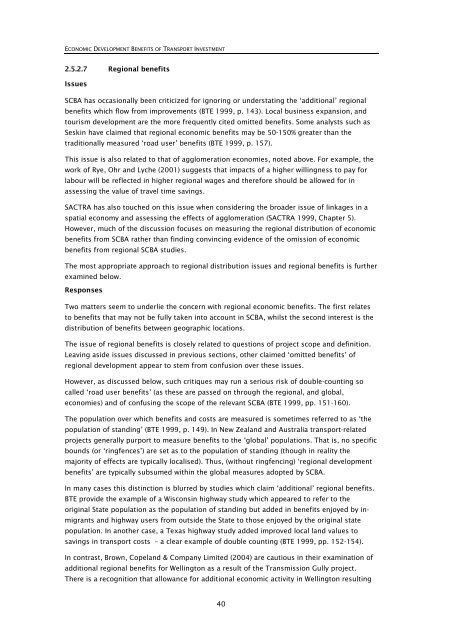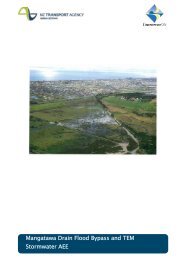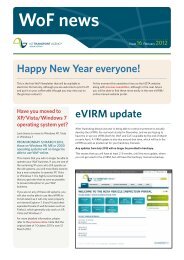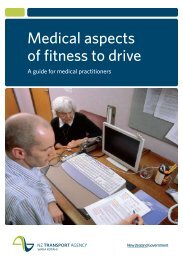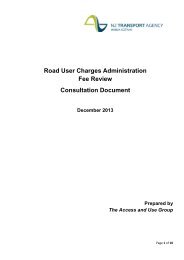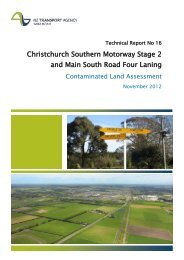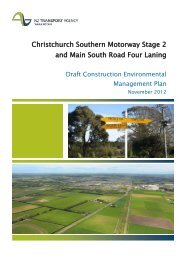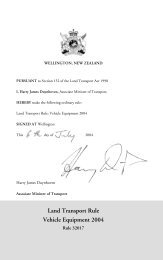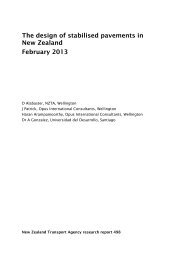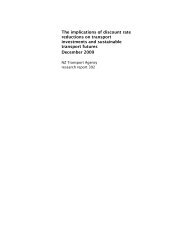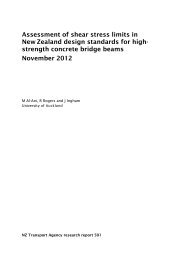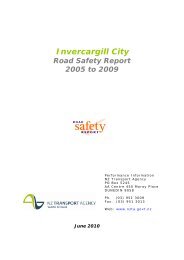Research 350 - NZ Transport Agency
Research 350 - NZ Transport Agency
Research 350 - NZ Transport Agency
Create successful ePaper yourself
Turn your PDF publications into a flip-book with our unique Google optimized e-Paper software.
ECONOMIC DEVELOPMENT BENEFITS OF TRANSPORT INVESTMENT<br />
2.5.2.7 Regional benefits<br />
Issues<br />
SCBA has occasionally been criticized for ignoring or understating the ‘additional’ regional<br />
benefits which flow from improvements (BTE 1999, p. 143). Local business expansion, and<br />
tourism development are the more frequently cited omitted benefits. Some analysts such as<br />
Seskin have claimed that regional economic benefits may be 50-150% greater than the<br />
traditionally measured ‘road user’ benefits (BTE 1999, p. 157).<br />
This issue is also related to that of agglomeration economies, noted above. For example, the<br />
work of Rye, Ohr and Lyche (2001) suggests that impacts of a higher willingness to pay for<br />
labour will be reflected in higher regional wages and therefore should be allowed for in<br />
assessing the value of travel time savings.<br />
SACTRA has also touched on this issue when considering the broader issue of linkages in a<br />
spatial economy and assessing the effects of agglomeration (SACTRA 1999, Chapter 5).<br />
However, much of the discussion focuses on measuring the regional distribution of economic<br />
benefits from SCBA rather than finding convincing evidence of the omission of economic<br />
benefits from regional SCBA studies.<br />
The most appropriate approach to regional distribution issues and regional benefits is further<br />
examined below.<br />
Responses<br />
Two matters seem to underlie the concern with regional economic benefits. The first relates<br />
to benefits that may not be fully taken into account in SCBA, whilst the second interest is the<br />
distribution of benefits between geographic locations.<br />
The issue of regional benefits is closely related to questions of project scope and definition.<br />
Leaving aside issues discussed in previous sections, other claimed ‘omitted benefits’ of<br />
regional development appear to stem from confusion over these issues.<br />
However, as discussed below, such critiques may run a serious risk of double-counting so<br />
called ‘road user benefits’ (as these are passed on through the regional, and global,<br />
economies) and of confusing the scope of the relevant SCBA (BTE 1999, pp. 151-160).<br />
The population over which benefits and costs are measured is sometimes referred to as ‘the<br />
population of standing’ (BTE 1999, p. 149). In New Zealand and Australia transport-related<br />
projects generally purport to measure benefits to the ‘global’ populations. That is, no specific<br />
bounds (or ‘ringfences’) are set as to the population of standing (though in reality the<br />
majority of effects are typically localised). Thus, (without ringfencing) ‘regional development<br />
benefits’ are typically subsumed within the global measures adopted by SCBA.<br />
In many cases this distinction is blurred by studies which claim ‘additional’ regional benefits.<br />
BTE provide the example of a Wisconsin highway study which appeared to refer to the<br />
original State population as the population of standing but added in benefits enjoyed by inmigrants<br />
and highway users from outside the State to those enjoyed by the original state<br />
population. In another case, a Texas highway study added improved local land values to<br />
savings in transport costs – a clear example of double counting (BTE 1999, pp. 152-154).<br />
In contrast, Brown, Copeland & Company Limited (2004) are cautious in their examination of<br />
additional regional benefits for Wellington as a result of the Transmission Gully project.<br />
There is a recognition that allowance for additional economic activity in Wellington resulting<br />
40


